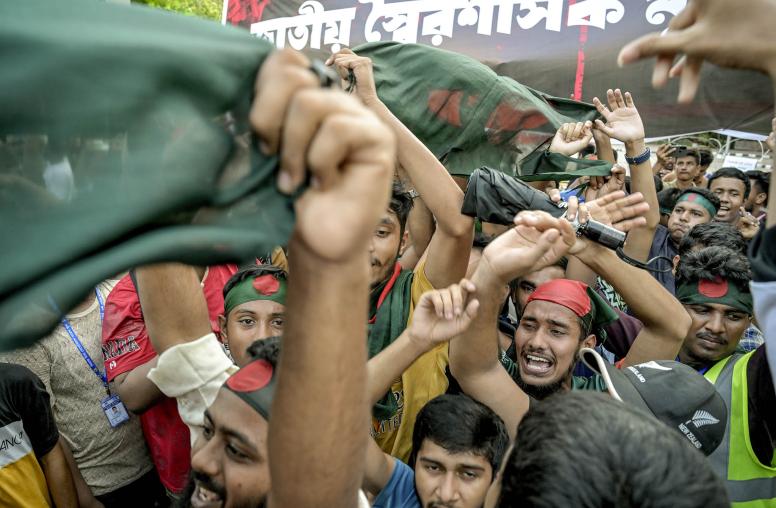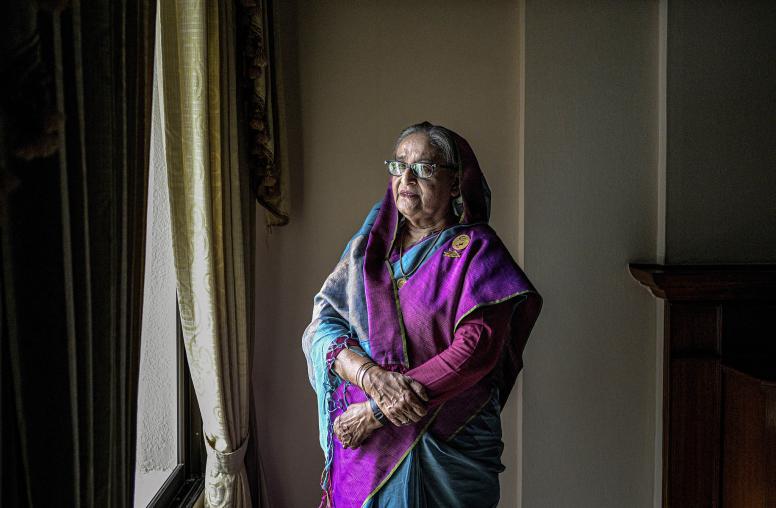Bangladesh: Survey Reveals Premier Remains Popular Despite Growing Public Discontent
While Bangladeshi citizens are pessimistic about the economy and elections, policies on infrastructure and development have buoyed Hasina’s public support.
Political tension is rising in Bangladesh ahead of the country’s next round of national elections, due by January 2024. The opposition Bangladesh Nationalist Party (BNP) is boycotting elections to extract concessions from the government on election management; rampant inflation is increasing citizens’ daily struggles; and both the BNP and ruling Awami League (AL) are holding large rallies across the country to mobilize their supporters. Yet in this tumultuous political scenario, there is little publicly available polling to understand the state of race.

The International Republican Institute (IRI) recently released a national survey and focus group discussion (FGD) study that shed light on Bangladesh's political, economic, and social dynamics. This research shows that though citizens are pessimistic about the state of the economy and elections, the government’s policies on infrastructure and development have buoyed the prime minister’s public support. Furthermore, while the opposition’s popularity is growing and its calls for a caretaker government are breaking through, Bangladeshis appear skeptical of its boycott strategy.
Public Pessimism
Bangladeshis are pessimistic about the economy, politics and overall state of the country. For the first time since IRI’s January 2014 Bangladesh poll, a majority say the country is heading in the wrong direction — up 38 percent since IRI’s poll in September 2019. Economic issues are driving this pessimism, with 50 percent of “wrong direction” respondents citing price hikes as the cause. Of respondents, 51 percent said the economy is doing poorly — up 35 percent since 2019.
Only 26 percent of adults believe the economic situation will improve in the coming year, while 36 percent expect it to worsen. Several FGD participants lamented the impact of rising prices on their families. A female FGD participant from Mymensingh said, “My husband’s salary did not increase, but the price of daily commodities is increasing daily. We face difficulties in maintaining our family.”
Bangladeshis are also frustrated with politics. Discontent about the state of democracy has risen significantly, and only a minority think the upcoming elections will be free and fair. Forty-five percent of the public say they fear expressing their political opinions. A female FGD participant from Khulna said, “If you say something about a political issue — if I say something, I have a fear that I may be murdered for this.”
Ordinary citizens also believe that political and civic institutions are not protecting their interests. A plurality (36 percent) cite corruption as the single most important problem in the country. More than eight in 10 Bangladeshis say there is a large gap between political elites and the people, and about one-third want new political parties to emerge. Even civil society is viewed negatively: 62 percent say civic groups represent the interests of elites.
The AL Remains Strong, but the BNP Is Gaining
The Bangladeshi public’s pervasive pessimism appears to be boosting the opposition’s popularity but has not yet substantially weakened the Sheikh Hasina government. About 70 percent of Bangladeshis say the prime minister is doing a good job, and majorities approve of the government’s performance on various policy issues from access to drinking water to improving education.
“If I look at development, then I see that [Sheikh Hasina] has done something,” said a female FGD participant from Khulna. “Like you see roads, the Padma Bridge, and the Metrorail.”
Still, majorities disapprove of the government’s performance on jobs and inflation. “It’s so tough to get a job that you may see a master’s degree graduate pulling a rickshaw,” said a woman in the Dhaka focus group.
With the public’s mood on the economy and politics souring, job approval for the opposition has risen from 36 percent in September 2019 to 63 percent — only seven percent behind the prime minister’s 70 percent approval rating.
Support for Caretaker Government but Not Boycott
The most contentious debate in Bangladesh’s politics currently centers on election administration. The BNP is boycotting all elections until the restoration of Bangladesh’s caretaker government (CTG) system, which installs a politically neutral government before election day. The AL — which scrapped the system after Bangladesh’s high court ruled it unconstitutional in 2011 — says the election commission can competently oversee fair elections.
Bangladeshis are divided on this issue. While 92 percent say they are very or somewhat likely to vote, a large plurality — 44 percent — say the CTG should be reinstated. Only 25 percent believe the ruling party should oversee elections, with another 25 percent supporting a bipartisan unity government during the election.
Without a CTG, many Bangladeshis believe the election will be unfair. Of those respondents who said they do not plan to vote, 55 percent cited election fraud in a previous election. A male focus group participant from Rangpur said, “If the current government is neutral, I will vote. Otherwise, I am not interested in voting. I have seen instances of rigging and tampering in polling centers … I am not sure if my vote even matters.”
Nevertheless, 56 percent of Bangladeshis say the opposition should compete in the election even if the CTG is not reinstated. In focus groups, many BNP supporters urged the party to run. “The opposition parties should give the message that there is someone who has the potential to fight the government,” said a woman from Mymensingh.
The Importance of Bangladesh’s 2024 Election
This data suggests that with about six months to go before the polls, public frustration is rising over the state of the country’s economy, politics and elections, but that the election’s outcome is far from certain. The 2024 contest has significant implications for Bangladesh’s democracy. A controversial election that fails to regain the public’s faith threatens to increase democratic disaffection and further alienate Bangladeshis from the country’s democratic traditions.
David Hoogstra is a program manager at the International Republican Institute.
This analysis was originally published by the Council on Foreign Relation’s Asia Unbound blog .



